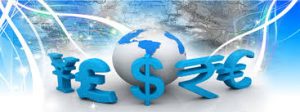 Investing and trading commodities can be an attractive proposition – for some, it’s a gold mine of a hobby – but the volume of jargon and specialized terminology involved can make for an intimidating introduction to world markets; after all, not everybody understands speculators and non-deliverable forwards. So, with that in mind, let’s break down one of the most popular trading markets – the foreign exchange or “forex” market – into tasty bits.
Investing and trading commodities can be an attractive proposition – for some, it’s a gold mine of a hobby – but the volume of jargon and specialized terminology involved can make for an intimidating introduction to world markets; after all, not everybody understands speculators and non-deliverable forwards. So, with that in mind, let’s break down one of the most popular trading markets – the foreign exchange or “forex” market – into tasty bits.
What Is It?
Like the black market, the forex market is not a real place – it’s decentralized, the term itself describing the general trade (buying and selling) of world currencies. In brief, forex traders buy currencies that are doing well or “appreciating” and sell them to earn a profit. For example, imagine that $1.00 is worth £0.80 on the market today; selling that dollar when its value has increased to £0.90 nets a profit of £0.10.
According to the Bank for International Settlements, more than US$5tn changes hand on a daily basis on the forex market, making it the largest market by trading volume in the world. It operates 24 hours a day during the week, with four “sessions” staggered by start time – the Sydney market opens first, followed by Tokyo, London, and New York. In general, the latter two markets see the lion’s share of activity.
How Can I Get Started?
A way to fast-track the introduction to forex is to visit this site, Forex Bonus, or ones like it. Forex Bonus provides a greatly streamlined market experience by finding the best brokers and offers, and eliminating the need to spend hours wading through small print. The page, which includes reviews from Vantage FX and IG Australia among others, also lists forex rebates, a perk that earns the investor cashback on trades.
It’s also worth reading up on some of the more successful forex traders, if only for inspiration. For example, George Soros, one of the richest people in the world, earned his billions by applying the ideas of philosopher Karl Popper to world markets, an impressive achievement for a man who started out selling souvenirs at the seaside. Also look up Stanley Druckenmiller, Bill Lipschutz, and Andrew Krieger.
Can You Beat the Market?
It’s here that the old maxim “buy low and sell high” comes in handy. Forex traders guess the movement of a currency’s value according to things like political events and previous market performance, and buy or sell it accordingly. It’s far from an exact science so research is important. For example, trading after something like the Brexit vote is ill-advised because the value of the pound will be volatile.
Factors worth considering when trading in a currency are the country or region’s GDP, unemployment data, and inflation indicators like the Consumer Price Index. However, beating the market also involves a great deal of personal development – being risk averse, reckless, or unwilling to learn are poor traits in a forex trader. If all else fails, though, there are hundreds of strategies and investment guides out there, of varying quality.
While it can be a tough sell to the clueless, forex trading is more accessible than it has ever been with plenty of material dedicated to getting new people on board.

No Comments